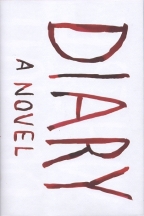Diary
Doubleday/Random House
US Hardcover First
ISBN: 0-385-50947-2
Publication Date: September, 2003
260 Pages; $24.95
Review Date: August 28, 2003
Reviewed by: Terry D'Auray © 2003
|

|
|
REFERENCES
|
COLUMNS
|
|
Horror,
Mystery,
General
Fiction
|
09-20-02,
09-30-02, 10-08-02,
01-07-03,
06-12-03,
08-22-03,
10-22-03
|
Chuck Palahniuk is one of the many authors I've read about, heard
praised by trusted fellow readers, meant to read, but just never
managed to get to. His reputation as a cult writer is intriguing. The
moniker "reinventor of the horror" is off-putting, the horror genre
having never been one of my favorites. At Rick's urging, but mostly
to see what reinvented horror might possibly mean, I picked up
'Diary', described as Palahniuk's "mainstream" novel. To my surprise,
it is written from the female character's perspective, in both the
first and third person. It is gruesome, but far less violent than I
had expected from the author of 'Fight Club'. And "reinvented horror"
translates into a thinking man's, slightly demented, 'Rosemary's
Baby' with more complex themes, more humor and absolutely killer
writing.
'Diary' is the story of Misty Marie Kleinman, a young art student
from a Georgia trailer park and Peter Wilmot, the bizarre young
blue-blooded man she meets and ultimately marries. Misty and Peter
move to Peter's home on Waytansea Island (Wayt an see - none too
subtle). She is pregnant with their daughter Tabbi; he is a
participant and pawn in an ancient island curse. Misty abandons art
to become a maid and waitress; he rebuilds houses on the mainland
with rooms that disappear. When we meet them, Peter is in a hospital
with brain tumor, comatose and cruelly, gruesomely contorted. Misty
is keeping a "coma diary" of her life while coping with Peter's
rightfully disgruntled clients, the rude and annoying tourists
overrunning the island, her daughter and her meddling mother-in-law.
And the island's local populace, all decked out in attire festooned
with commercial slogans, appears unnaturally interested in Misty's
art. And then bizarre and bad things begin to happen.
This is where I would normally roll my eyes, tune out and move on.
And I likely would have were it not for Palahniuk's unbelievably
inventive and original writing. His twisted style and exceptional
skill hooked me from the first page. Even though I knew it was going
to end badly.
Misty is the single fully developed character in the book. She
breathes and seethes with disappointment and despair at the state of
her life. A bit mean spirited, more than a little bitter and wholly
cynical, Misty gets through each grueling day with "a couple of
drinks and a couple of aspirin. Repeat". She is both reflective and
resilient, an all-too-real figure midst the otherworldliness of her
surroundings. And she's thoroughly engaging.
Palahniuk writes on the bleeding edge of cynicsm; his words are
dark, cold and very tough. His humor has a bite; it's acerbic, mean
and chilling. He's the master of images both ghostly and ghastly -
distorted bodies, needles through nipples, shriveled appendages.
Humorous and creepy, bizarre and unexpected, his writing is original,
emotionally satisfying and highly entertaining.
'Diary's themes are varied, from the commonplace - satiric disgust
at hollow commercialization and environmental disintegration, to the
more complex - misery as muse, art through suffering, and the
artist's place in the world. These themes are hammered, and hammered
again. Palahniuk's repetition creates hypnotic mantras that recur and
replay with increasing intensity. Mixing philosophy, art, religion,
psychology, and mythology, he builds suspense as well as terror, and
makes the incredible real. Or surreal.
I was devouring this book with eagerness and admiration...until
the third act when Palahniuk piled on the horror, dialed up the
insanity and turned the plot into the Book of Revelations. I felt
like a pinwheel, flicked by Palahniuk's narrative gyrations first
right, then left, then right again. Dizziness overtook pleasure;
craziness reigned (or rained) supreme. In full-fledged horror mode,
the story zoomed over the top into the ludicrous, for me, all too
easily distanced and dismissed. I felt like I was careening down the
halls of the Stanley Hotel (not the Waytansea) with a demented Jack
Nicholson brandishing an axe!
So Diary's ending came unglued, spun out of control and ultimately
disappointed. It mattered not at all. While his storytelling
ultimately didn't suit, Palahniuk's prose most certainly did.
Cynical, humorous, dark and richly bizarre, Palahniuk's trump card is
his wholly original and thoroughly engaging writing style.
